Analysis of CSR and Sustainability in the Food Industry: Report
VerifiedAdded on 2023/01/12
|12
|3842
|89
Report
AI Summary
This report delves into the critical aspects of Corporate Social Responsibility (CSR) and sustainability within the food industry. It begins by outlining the key challenges faced, including environmental responsibility, product safety, animal welfare, occupational welfare, local well-being, nutrition, and economic considerations. The report then analyzes best practices within the sector, highlighting companies like Leon and Starbucks that have successfully integrated ethical and moral principles into their operations. Leon is praised for its nutritional approach to fast food, while Starbucks is recognized for its ethical sourcing and community investment. Finally, the report offers recommendations for food businesses to enhance their CSR performance, emphasizing global considerations and ethical practices. The overall aim is to provide a comprehensive understanding of the food industry's role in CSR and sustainability, offering insights for businesses to improve their social and environmental impact.
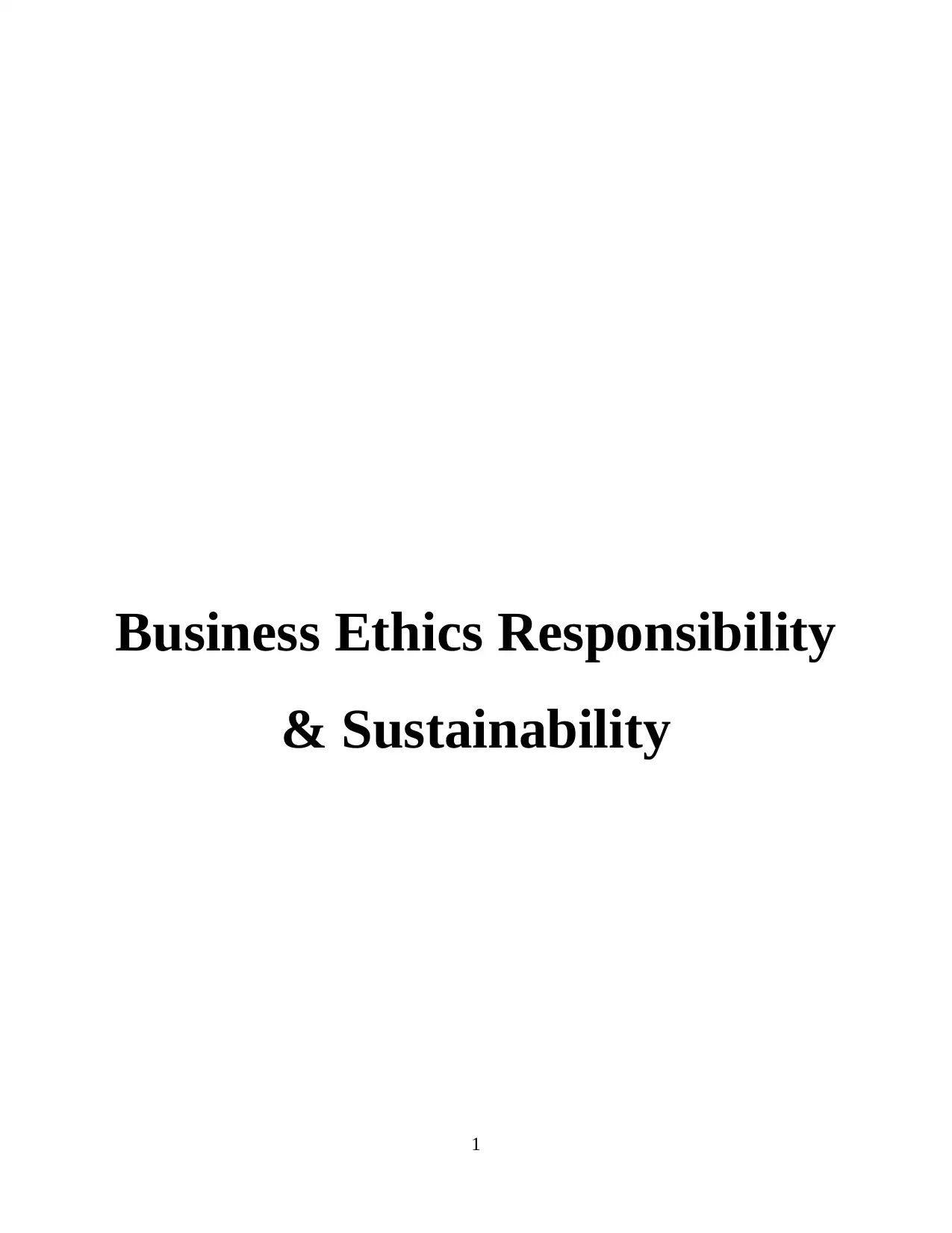
Business Ethics Responsibility
& Sustainability
1
& Sustainability
1
Paraphrase This Document
Need a fresh take? Get an instant paraphrase of this document with our AI Paraphraser
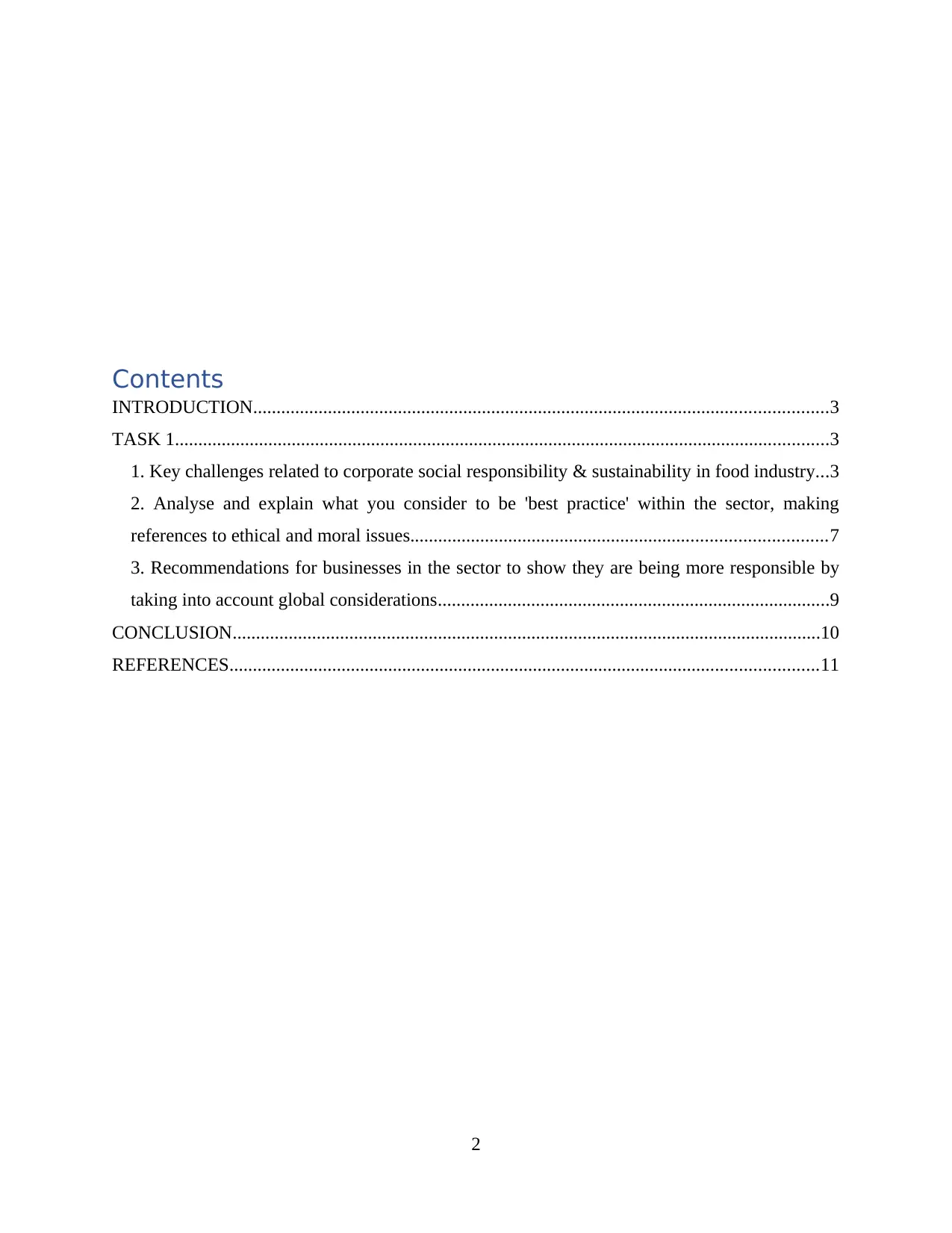
Contents
INTRODUCTION...........................................................................................................................3
TASK 1............................................................................................................................................3
1. Key challenges related to corporate social responsibility & sustainability in food industry...3
2. Analyse and explain what you consider to be 'best practice' within the sector, making
references to ethical and moral issues.........................................................................................7
3. Recommendations for businesses in the sector to show they are being more responsible by
taking into account global considerations....................................................................................9
CONCLUSION..............................................................................................................................10
REFERENCES..............................................................................................................................11
2
INTRODUCTION...........................................................................................................................3
TASK 1............................................................................................................................................3
1. Key challenges related to corporate social responsibility & sustainability in food industry...3
2. Analyse and explain what you consider to be 'best practice' within the sector, making
references to ethical and moral issues.........................................................................................7
3. Recommendations for businesses in the sector to show they are being more responsible by
taking into account global considerations....................................................................................9
CONCLUSION..............................................................................................................................10
REFERENCES..............................................................................................................................11
2
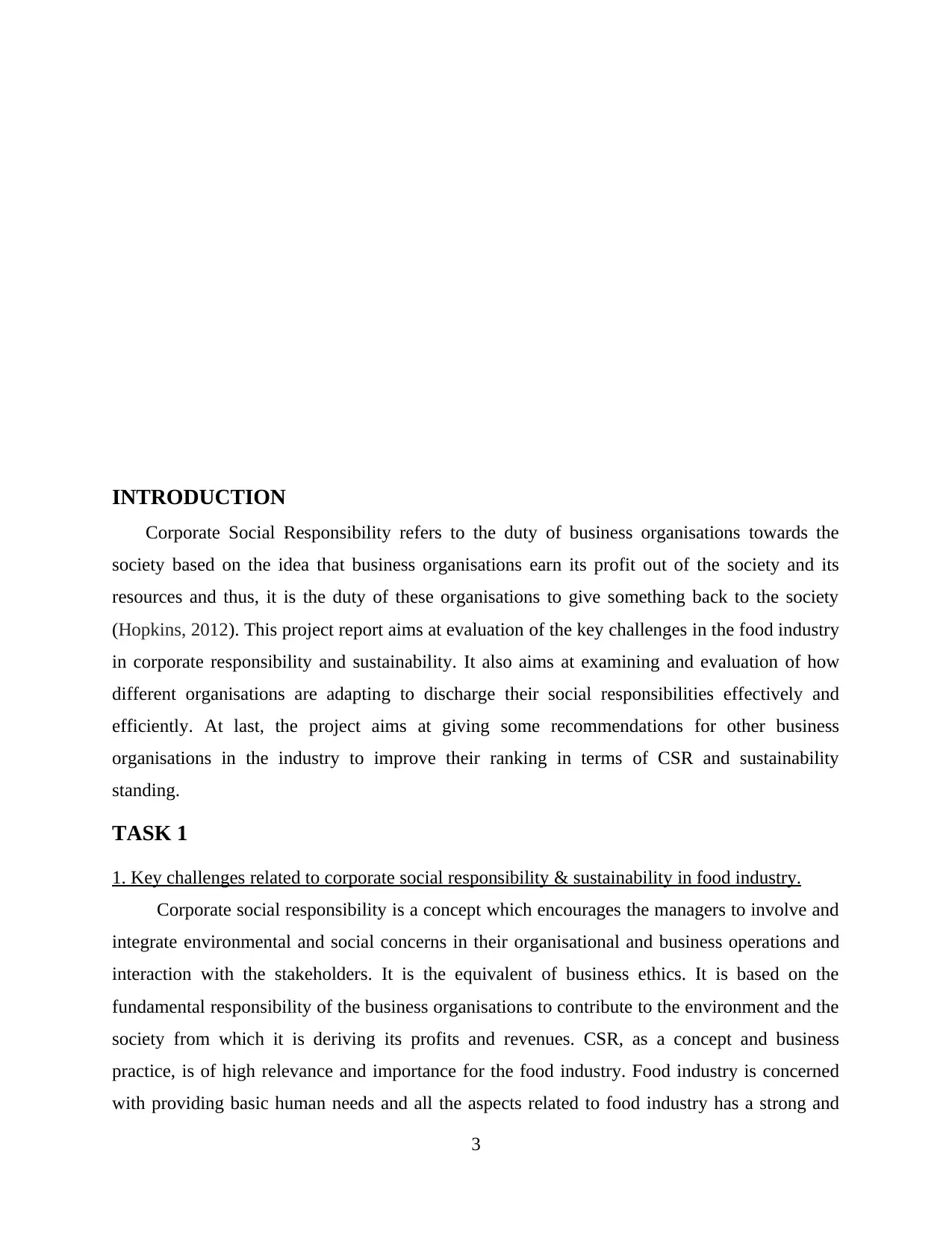
INTRODUCTION
Corporate Social Responsibility refers to the duty of business organisations towards the
society based on the idea that business organisations earn its profit out of the society and its
resources and thus, it is the duty of these organisations to give something back to the society
(Hopkins, 2012). This project report aims at evaluation of the key challenges in the food industry
in corporate responsibility and sustainability. It also aims at examining and evaluation of how
different organisations are adapting to discharge their social responsibilities effectively and
efficiently. At last, the project aims at giving some recommendations for other business
organisations in the industry to improve their ranking in terms of CSR and sustainability
standing.
TASK 1
1. Key challenges related to corporate social responsibility & sustainability in food industry.
Corporate social responsibility is a concept which encourages the managers to involve and
integrate environmental and social concerns in their organisational and business operations and
interaction with the stakeholders. It is the equivalent of business ethics. It is based on the
fundamental responsibility of the business organisations to contribute to the environment and the
society from which it is deriving its profits and revenues. CSR, as a concept and business
practice, is of high relevance and importance for the food industry. Food industry is concerned
with providing basic human needs and all the aspects related to food industry has a strong and
3
Corporate Social Responsibility refers to the duty of business organisations towards the
society based on the idea that business organisations earn its profit out of the society and its
resources and thus, it is the duty of these organisations to give something back to the society
(Hopkins, 2012). This project report aims at evaluation of the key challenges in the food industry
in corporate responsibility and sustainability. It also aims at examining and evaluation of how
different organisations are adapting to discharge their social responsibilities effectively and
efficiently. At last, the project aims at giving some recommendations for other business
organisations in the industry to improve their ranking in terms of CSR and sustainability
standing.
TASK 1
1. Key challenges related to corporate social responsibility & sustainability in food industry.
Corporate social responsibility is a concept which encourages the managers to involve and
integrate environmental and social concerns in their organisational and business operations and
interaction with the stakeholders. It is the equivalent of business ethics. It is based on the
fundamental responsibility of the business organisations to contribute to the environment and the
society from which it is deriving its profits and revenues. CSR, as a concept and business
practice, is of high relevance and importance for the food industry. Food industry is concerned
with providing basic human needs and all the aspects related to food industry has a strong and
3
⊘ This is a preview!⊘
Do you want full access?
Subscribe today to unlock all pages.

Trusted by 1+ million students worldwide
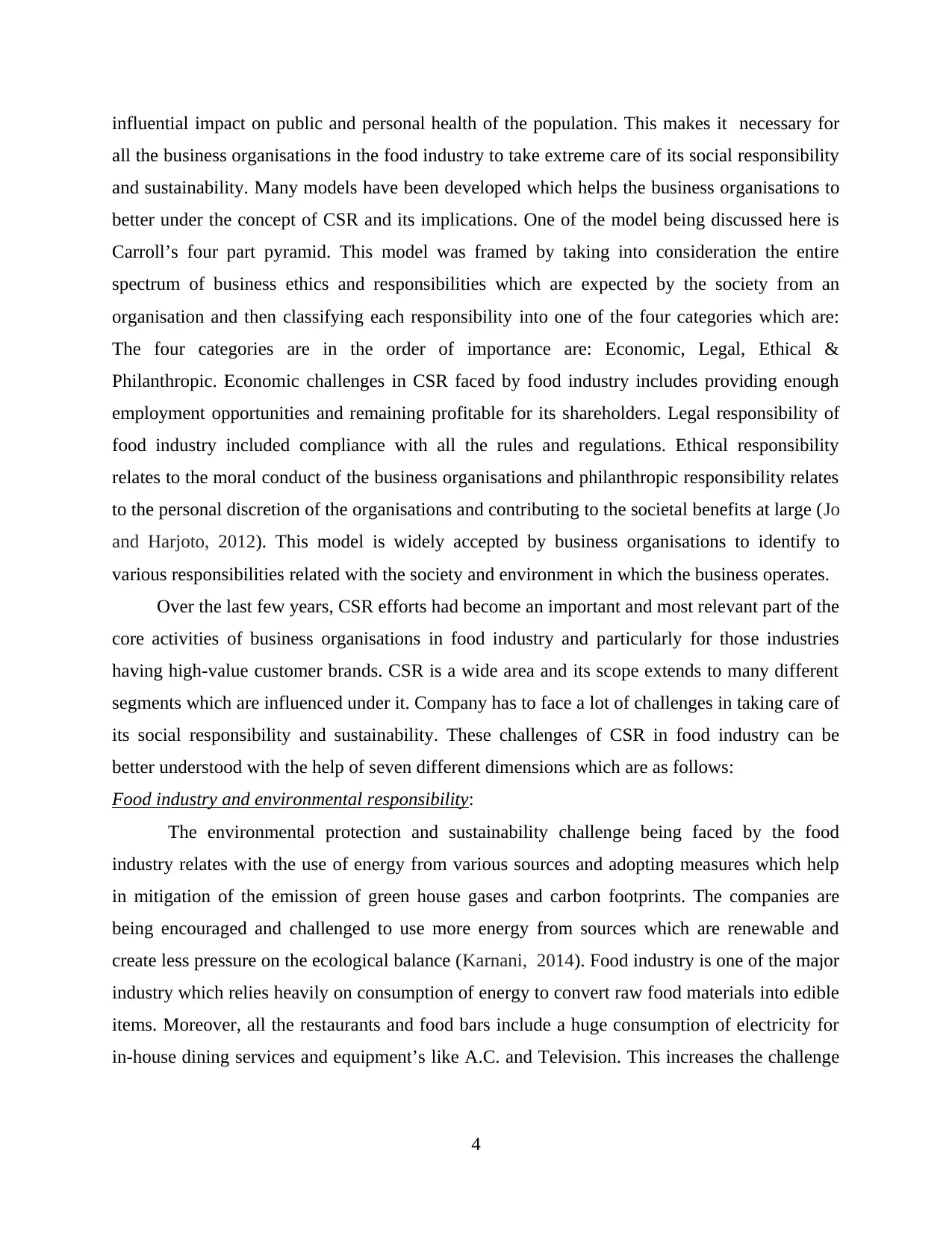
influential impact on public and personal health of the population. This makes it necessary for
all the business organisations in the food industry to take extreme care of its social responsibility
and sustainability. Many models have been developed which helps the business organisations to
better under the concept of CSR and its implications. One of the model being discussed here is
Carroll’s four part pyramid. This model was framed by taking into consideration the entire
spectrum of business ethics and responsibilities which are expected by the society from an
organisation and then classifying each responsibility into one of the four categories which are:
The four categories are in the order of importance are: Economic, Legal, Ethical &
Philanthropic. Economic challenges in CSR faced by food industry includes providing enough
employment opportunities and remaining profitable for its shareholders. Legal responsibility of
food industry included compliance with all the rules and regulations. Ethical responsibility
relates to the moral conduct of the business organisations and philanthropic responsibility relates
to the personal discretion of the organisations and contributing to the societal benefits at large (Jo
and Harjoto, 2012). This model is widely accepted by business organisations to identify to
various responsibilities related with the society and environment in which the business operates.
Over the last few years, CSR efforts had become an important and most relevant part of the
core activities of business organisations in food industry and particularly for those industries
having high-value customer brands. CSR is a wide area and its scope extends to many different
segments which are influenced under it. Company has to face a lot of challenges in taking care of
its social responsibility and sustainability. These challenges of CSR in food industry can be
better understood with the help of seven different dimensions which are as follows:
Food industry and environmental responsibility:
The environmental protection and sustainability challenge being faced by the food
industry relates with the use of energy from various sources and adopting measures which help
in mitigation of the emission of green house gases and carbon footprints. The companies are
being encouraged and challenged to use more energy from sources which are renewable and
create less pressure on the ecological balance (Karnani, 2014). Food industry is one of the major
industry which relies heavily on consumption of energy to convert raw food materials into edible
items. Moreover, all the restaurants and food bars include a huge consumption of electricity for
in-house dining services and equipment’s like A.C. and Television. This increases the challenge
4
all the business organisations in the food industry to take extreme care of its social responsibility
and sustainability. Many models have been developed which helps the business organisations to
better under the concept of CSR and its implications. One of the model being discussed here is
Carroll’s four part pyramid. This model was framed by taking into consideration the entire
spectrum of business ethics and responsibilities which are expected by the society from an
organisation and then classifying each responsibility into one of the four categories which are:
The four categories are in the order of importance are: Economic, Legal, Ethical &
Philanthropic. Economic challenges in CSR faced by food industry includes providing enough
employment opportunities and remaining profitable for its shareholders. Legal responsibility of
food industry included compliance with all the rules and regulations. Ethical responsibility
relates to the moral conduct of the business organisations and philanthropic responsibility relates
to the personal discretion of the organisations and contributing to the societal benefits at large (Jo
and Harjoto, 2012). This model is widely accepted by business organisations to identify to
various responsibilities related with the society and environment in which the business operates.
Over the last few years, CSR efforts had become an important and most relevant part of the
core activities of business organisations in food industry and particularly for those industries
having high-value customer brands. CSR is a wide area and its scope extends to many different
segments which are influenced under it. Company has to face a lot of challenges in taking care of
its social responsibility and sustainability. These challenges of CSR in food industry can be
better understood with the help of seven different dimensions which are as follows:
Food industry and environmental responsibility:
The environmental protection and sustainability challenge being faced by the food
industry relates with the use of energy from various sources and adopting measures which help
in mitigation of the emission of green house gases and carbon footprints. The companies are
being encouraged and challenged to use more energy from sources which are renewable and
create less pressure on the ecological balance (Karnani, 2014). Food industry is one of the major
industry which relies heavily on consumption of energy to convert raw food materials into edible
items. Moreover, all the restaurants and food bars include a huge consumption of electricity for
in-house dining services and equipment’s like A.C. and Television. This increases the challenge
4
Paraphrase This Document
Need a fresh take? Get an instant paraphrase of this document with our AI Paraphraser
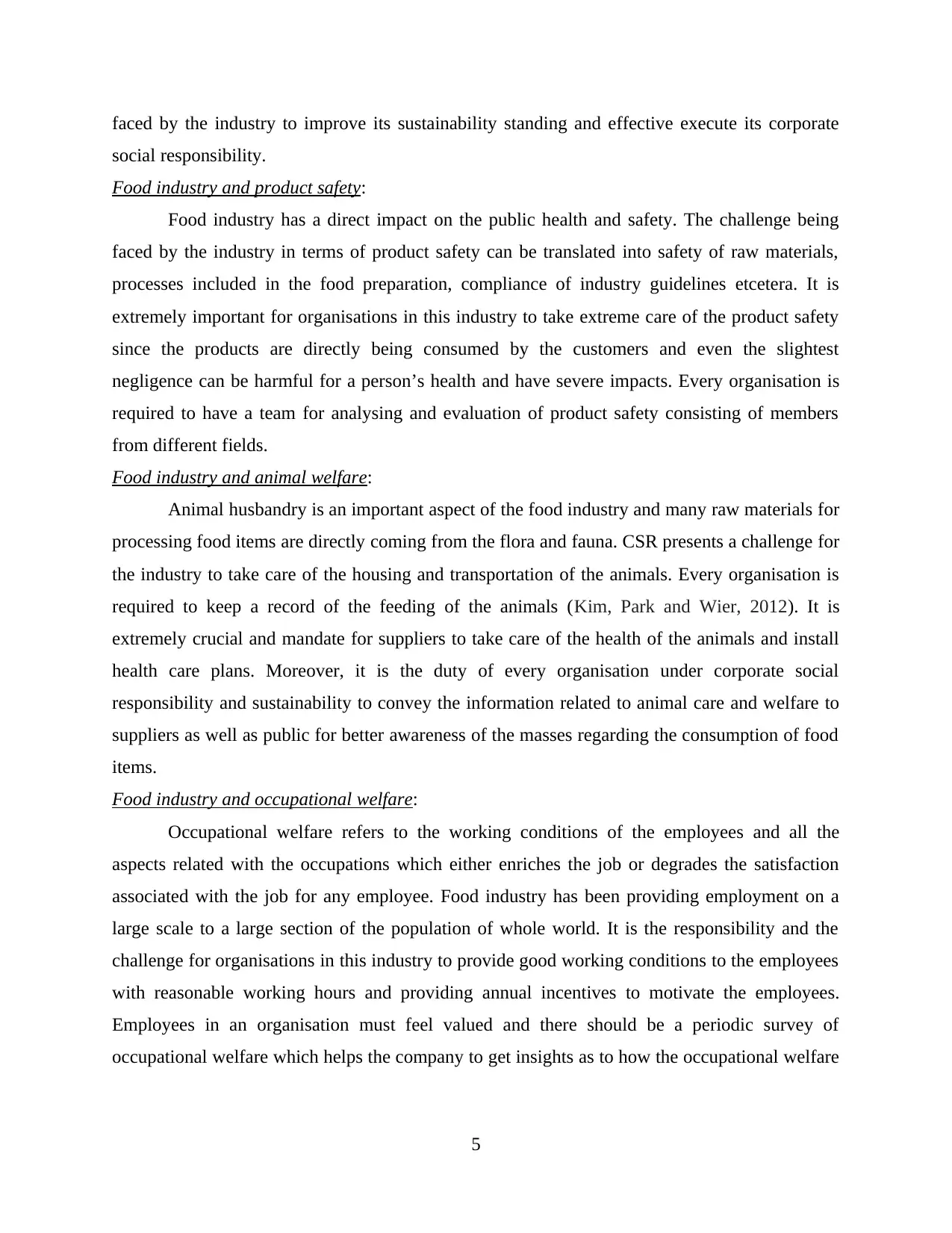
faced by the industry to improve its sustainability standing and effective execute its corporate
social responsibility.
Food industry and product safety:
Food industry has a direct impact on the public health and safety. The challenge being
faced by the industry in terms of product safety can be translated into safety of raw materials,
processes included in the food preparation, compliance of industry guidelines etcetera. It is
extremely important for organisations in this industry to take extreme care of the product safety
since the products are directly being consumed by the customers and even the slightest
negligence can be harmful for a person’s health and have severe impacts. Every organisation is
required to have a team for analysing and evaluation of product safety consisting of members
from different fields.
Food industry and animal welfare:
Animal husbandry is an important aspect of the food industry and many raw materials for
processing food items are directly coming from the flora and fauna. CSR presents a challenge for
the industry to take care of the housing and transportation of the animals. Every organisation is
required to keep a record of the feeding of the animals (Kim, Park and Wier, 2012). It is
extremely crucial and mandate for suppliers to take care of the health of the animals and install
health care plans. Moreover, it is the duty of every organisation under corporate social
responsibility and sustainability to convey the information related to animal care and welfare to
suppliers as well as public for better awareness of the masses regarding the consumption of food
items.
Food industry and occupational welfare:
Occupational welfare refers to the working conditions of the employees and all the
aspects related with the occupations which either enriches the job or degrades the satisfaction
associated with the job for any employee. Food industry has been providing employment on a
large scale to a large section of the population of whole world. It is the responsibility and the
challenge for organisations in this industry to provide good working conditions to the employees
with reasonable working hours and providing annual incentives to motivate the employees.
Employees in an organisation must feel valued and there should be a periodic survey of
occupational welfare which helps the company to get insights as to how the occupational welfare
5
social responsibility.
Food industry and product safety:
Food industry has a direct impact on the public health and safety. The challenge being
faced by the industry in terms of product safety can be translated into safety of raw materials,
processes included in the food preparation, compliance of industry guidelines etcetera. It is
extremely important for organisations in this industry to take extreme care of the product safety
since the products are directly being consumed by the customers and even the slightest
negligence can be harmful for a person’s health and have severe impacts. Every organisation is
required to have a team for analysing and evaluation of product safety consisting of members
from different fields.
Food industry and animal welfare:
Animal husbandry is an important aspect of the food industry and many raw materials for
processing food items are directly coming from the flora and fauna. CSR presents a challenge for
the industry to take care of the housing and transportation of the animals. Every organisation is
required to keep a record of the feeding of the animals (Kim, Park and Wier, 2012). It is
extremely crucial and mandate for suppliers to take care of the health of the animals and install
health care plans. Moreover, it is the duty of every organisation under corporate social
responsibility and sustainability to convey the information related to animal care and welfare to
suppliers as well as public for better awareness of the masses regarding the consumption of food
items.
Food industry and occupational welfare:
Occupational welfare refers to the working conditions of the employees and all the
aspects related with the occupations which either enriches the job or degrades the satisfaction
associated with the job for any employee. Food industry has been providing employment on a
large scale to a large section of the population of whole world. It is the responsibility and the
challenge for organisations in this industry to provide good working conditions to the employees
with reasonable working hours and providing annual incentives to motivate the employees.
Employees in an organisation must feel valued and there should be a periodic survey of
occupational welfare which helps the company to get insights as to how the occupational welfare
5
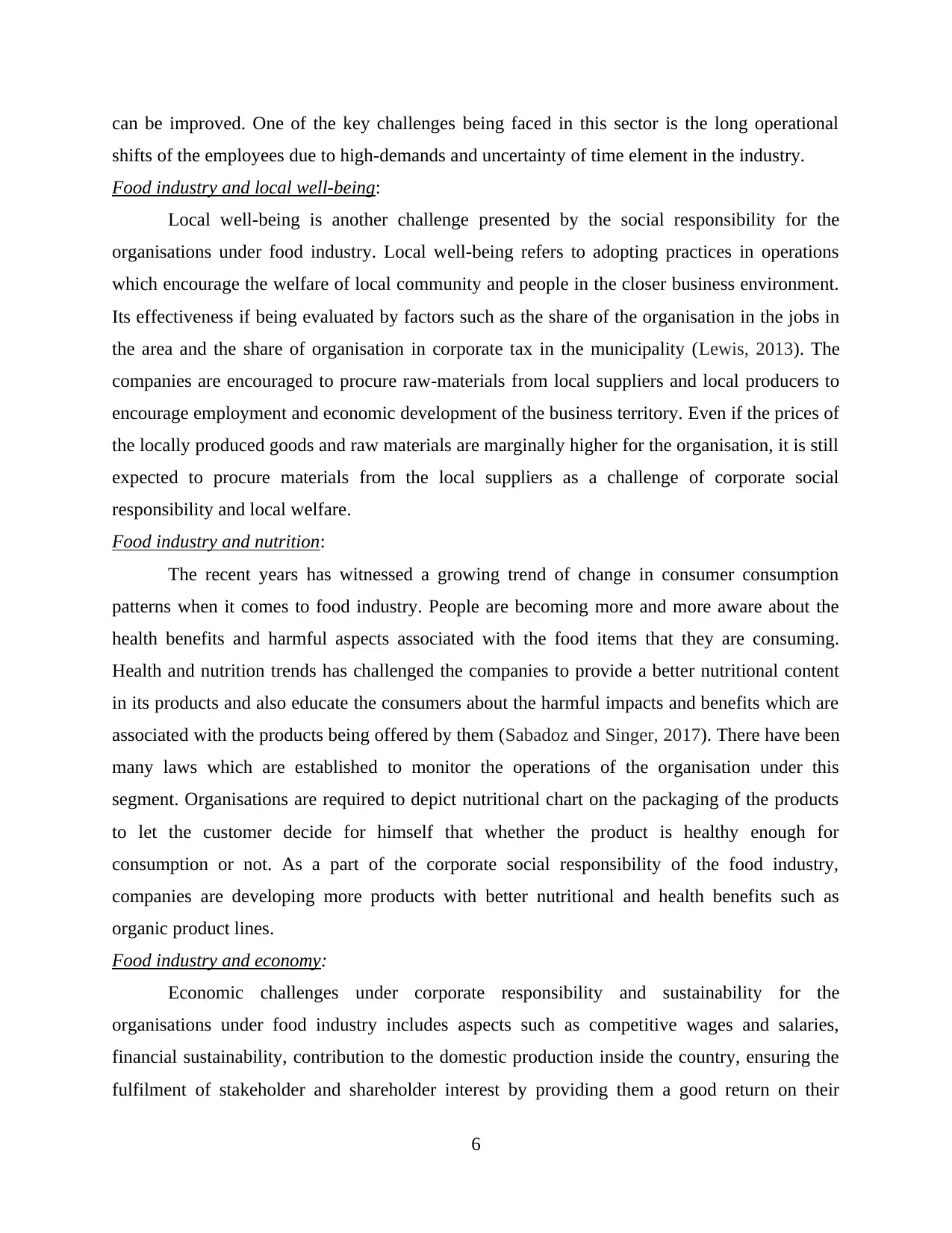
can be improved. One of the key challenges being faced in this sector is the long operational
shifts of the employees due to high-demands and uncertainty of time element in the industry.
Food industry and local well-being:
Local well-being is another challenge presented by the social responsibility for the
organisations under food industry. Local well-being refers to adopting practices in operations
which encourage the welfare of local community and people in the closer business environment.
Its effectiveness if being evaluated by factors such as the share of the organisation in the jobs in
the area and the share of organisation in corporate tax in the municipality (Lewis, 2013). The
companies are encouraged to procure raw-materials from local suppliers and local producers to
encourage employment and economic development of the business territory. Even if the prices of
the locally produced goods and raw materials are marginally higher for the organisation, it is still
expected to procure materials from the local suppliers as a challenge of corporate social
responsibility and local welfare.
Food industry and nutrition:
The recent years has witnessed a growing trend of change in consumer consumption
patterns when it comes to food industry. People are becoming more and more aware about the
health benefits and harmful aspects associated with the food items that they are consuming.
Health and nutrition trends has challenged the companies to provide a better nutritional content
in its products and also educate the consumers about the harmful impacts and benefits which are
associated with the products being offered by them (Sabadoz and Singer, 2017). There have been
many laws which are established to monitor the operations of the organisation under this
segment. Organisations are required to depict nutritional chart on the packaging of the products
to let the customer decide for himself that whether the product is healthy enough for
consumption or not. As a part of the corporate social responsibility of the food industry,
companies are developing more products with better nutritional and health benefits such as
organic product lines.
Food industry and economy:
Economic challenges under corporate responsibility and sustainability for the
organisations under food industry includes aspects such as competitive wages and salaries,
financial sustainability, contribution to the domestic production inside the country, ensuring the
fulfilment of stakeholder and shareholder interest by providing them a good return on their
6
shifts of the employees due to high-demands and uncertainty of time element in the industry.
Food industry and local well-being:
Local well-being is another challenge presented by the social responsibility for the
organisations under food industry. Local well-being refers to adopting practices in operations
which encourage the welfare of local community and people in the closer business environment.
Its effectiveness if being evaluated by factors such as the share of the organisation in the jobs in
the area and the share of organisation in corporate tax in the municipality (Lewis, 2013). The
companies are encouraged to procure raw-materials from local suppliers and local producers to
encourage employment and economic development of the business territory. Even if the prices of
the locally produced goods and raw materials are marginally higher for the organisation, it is still
expected to procure materials from the local suppliers as a challenge of corporate social
responsibility and local welfare.
Food industry and nutrition:
The recent years has witnessed a growing trend of change in consumer consumption
patterns when it comes to food industry. People are becoming more and more aware about the
health benefits and harmful aspects associated with the food items that they are consuming.
Health and nutrition trends has challenged the companies to provide a better nutritional content
in its products and also educate the consumers about the harmful impacts and benefits which are
associated with the products being offered by them (Sabadoz and Singer, 2017). There have been
many laws which are established to monitor the operations of the organisation under this
segment. Organisations are required to depict nutritional chart on the packaging of the products
to let the customer decide for himself that whether the product is healthy enough for
consumption or not. As a part of the corporate social responsibility of the food industry,
companies are developing more products with better nutritional and health benefits such as
organic product lines.
Food industry and economy:
Economic challenges under corporate responsibility and sustainability for the
organisations under food industry includes aspects such as competitive wages and salaries,
financial sustainability, contribution to the domestic production inside the country, ensuring the
fulfilment of stakeholder and shareholder interest by providing them a good return on their
6
⊘ This is a preview!⊘
Do you want full access?
Subscribe today to unlock all pages.

Trusted by 1+ million students worldwide
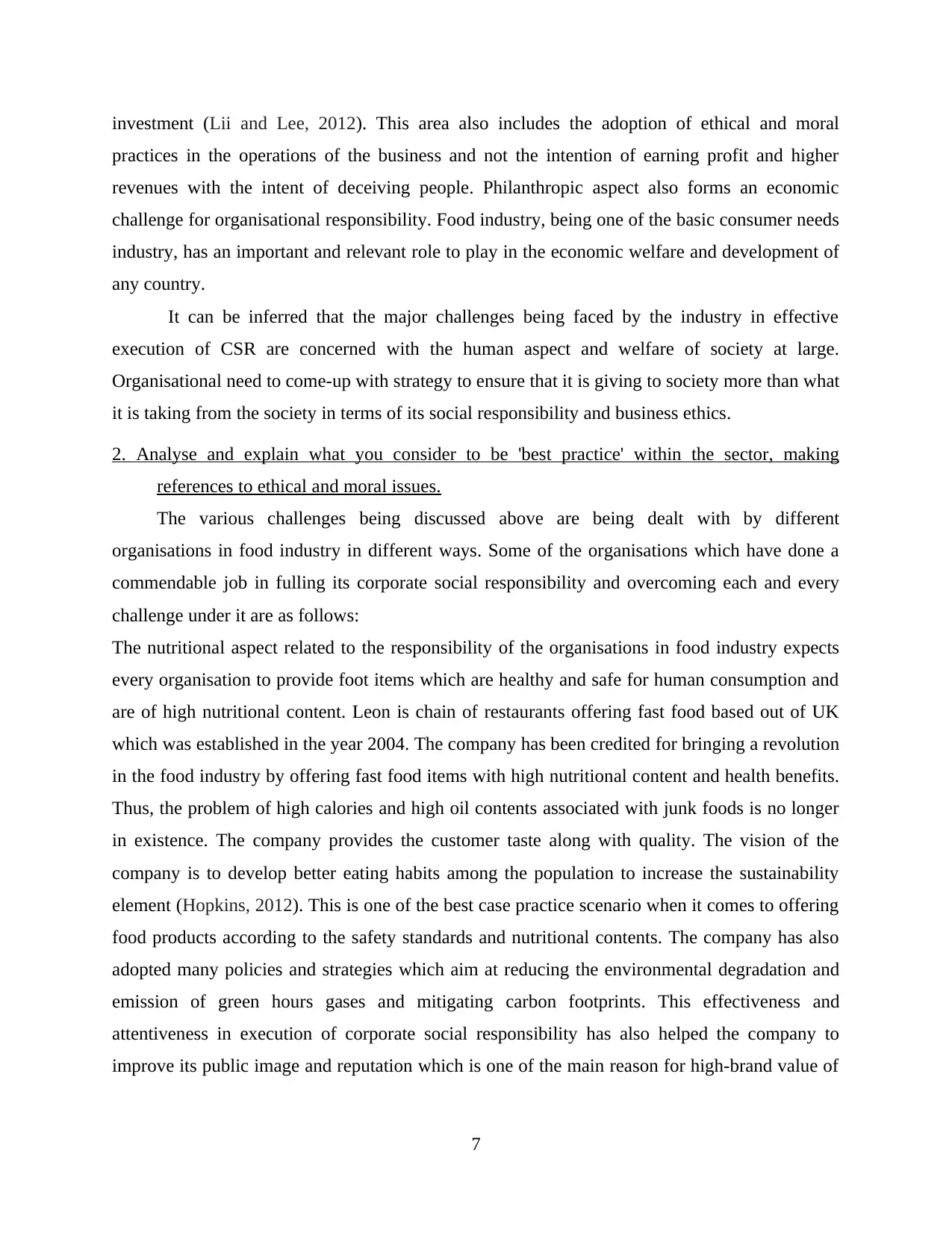
investment (Lii and Lee, 2012). This area also includes the adoption of ethical and moral
practices in the operations of the business and not the intention of earning profit and higher
revenues with the intent of deceiving people. Philanthropic aspect also forms an economic
challenge for organisational responsibility. Food industry, being one of the basic consumer needs
industry, has an important and relevant role to play in the economic welfare and development of
any country.
It can be inferred that the major challenges being faced by the industry in effective
execution of CSR are concerned with the human aspect and welfare of society at large.
Organisational need to come-up with strategy to ensure that it is giving to society more than what
it is taking from the society in terms of its social responsibility and business ethics.
2. Analyse and explain what you consider to be 'best practice' within the sector, making
references to ethical and moral issues.
The various challenges being discussed above are being dealt with by different
organisations in food industry in different ways. Some of the organisations which have done a
commendable job in fulling its corporate social responsibility and overcoming each and every
challenge under it are as follows:
The nutritional aspect related to the responsibility of the organisations in food industry expects
every organisation to provide foot items which are healthy and safe for human consumption and
are of high nutritional content. Leon is chain of restaurants offering fast food based out of UK
which was established in the year 2004. The company has been credited for bringing a revolution
in the food industry by offering fast food items with high nutritional content and health benefits.
Thus, the problem of high calories and high oil contents associated with junk foods is no longer
in existence. The company provides the customer taste along with quality. The vision of the
company is to develop better eating habits among the population to increase the sustainability
element (Hopkins, 2012). This is one of the best case practice scenario when it comes to offering
food products according to the safety standards and nutritional contents. The company has also
adopted many policies and strategies which aim at reducing the environmental degradation and
emission of green hours gases and mitigating carbon footprints. This effectiveness and
attentiveness in execution of corporate social responsibility has also helped the company to
improve its public image and reputation which is one of the main reason for high-brand value of
7
practices in the operations of the business and not the intention of earning profit and higher
revenues with the intent of deceiving people. Philanthropic aspect also forms an economic
challenge for organisational responsibility. Food industry, being one of the basic consumer needs
industry, has an important and relevant role to play in the economic welfare and development of
any country.
It can be inferred that the major challenges being faced by the industry in effective
execution of CSR are concerned with the human aspect and welfare of society at large.
Organisational need to come-up with strategy to ensure that it is giving to society more than what
it is taking from the society in terms of its social responsibility and business ethics.
2. Analyse and explain what you consider to be 'best practice' within the sector, making
references to ethical and moral issues.
The various challenges being discussed above are being dealt with by different
organisations in food industry in different ways. Some of the organisations which have done a
commendable job in fulling its corporate social responsibility and overcoming each and every
challenge under it are as follows:
The nutritional aspect related to the responsibility of the organisations in food industry expects
every organisation to provide foot items which are healthy and safe for human consumption and
are of high nutritional content. Leon is chain of restaurants offering fast food based out of UK
which was established in the year 2004. The company has been credited for bringing a revolution
in the food industry by offering fast food items with high nutritional content and health benefits.
Thus, the problem of high calories and high oil contents associated with junk foods is no longer
in existence. The company provides the customer taste along with quality. The vision of the
company is to develop better eating habits among the population to increase the sustainability
element (Hopkins, 2012). This is one of the best case practice scenario when it comes to offering
food products according to the safety standards and nutritional contents. The company has also
adopted many policies and strategies which aim at reducing the environmental degradation and
emission of green hours gases and mitigating carbon footprints. This effectiveness and
attentiveness in execution of corporate social responsibility has also helped the company to
improve its public image and reputation which is one of the main reason for high-brand value of
7
Paraphrase This Document
Need a fresh take? Get an instant paraphrase of this document with our AI Paraphraser
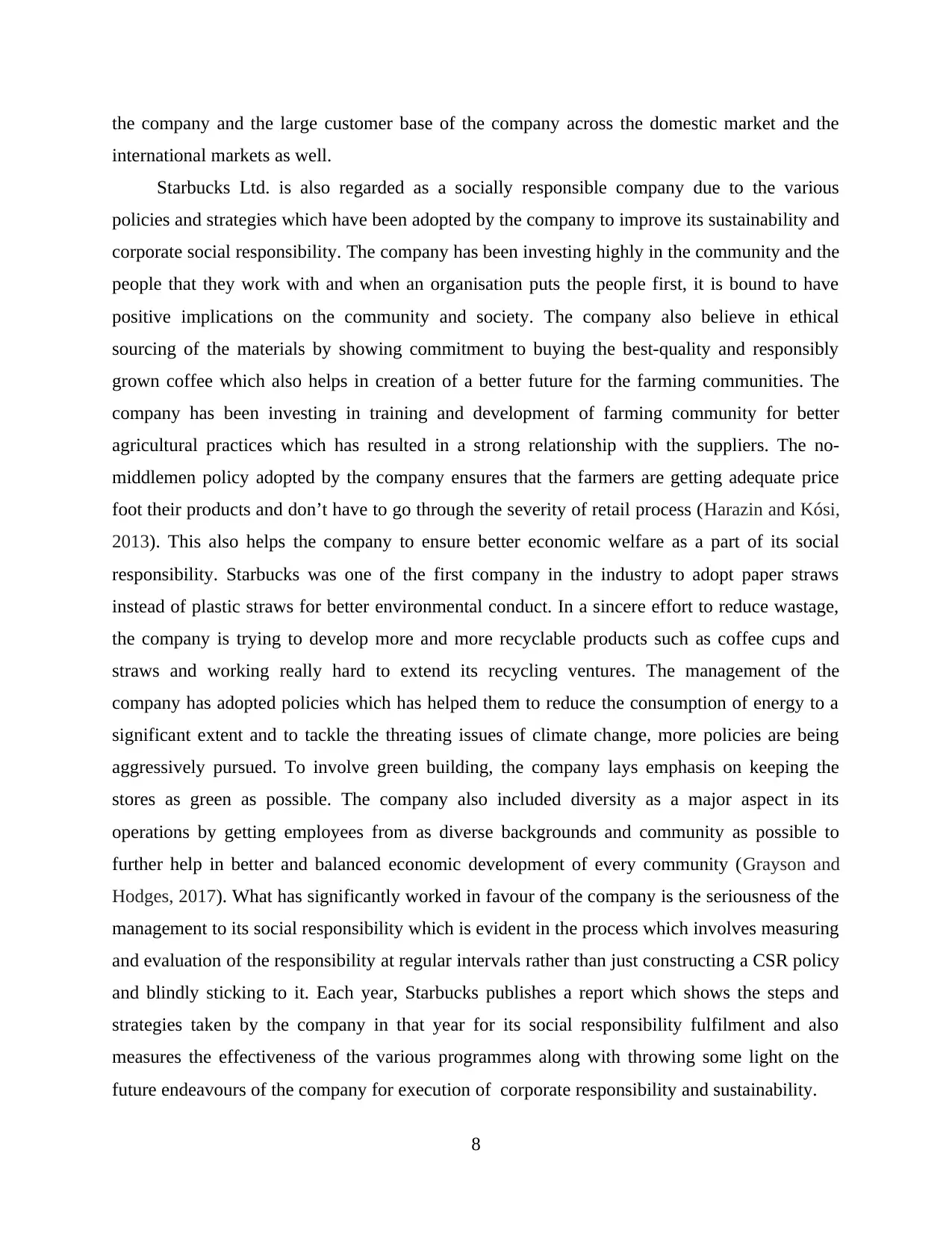
the company and the large customer base of the company across the domestic market and the
international markets as well.
Starbucks Ltd. is also regarded as a socially responsible company due to the various
policies and strategies which have been adopted by the company to improve its sustainability and
corporate social responsibility. The company has been investing highly in the community and the
people that they work with and when an organisation puts the people first, it is bound to have
positive implications on the community and society. The company also believe in ethical
sourcing of the materials by showing commitment to buying the best-quality and responsibly
grown coffee which also helps in creation of a better future for the farming communities. The
company has been investing in training and development of farming community for better
agricultural practices which has resulted in a strong relationship with the suppliers. The no-
middlemen policy adopted by the company ensures that the farmers are getting adequate price
foot their products and don’t have to go through the severity of retail process (Harazin and Kósi,
2013). This also helps the company to ensure better economic welfare as a part of its social
responsibility. Starbucks was one of the first company in the industry to adopt paper straws
instead of plastic straws for better environmental conduct. In a sincere effort to reduce wastage,
the company is trying to develop more and more recyclable products such as coffee cups and
straws and working really hard to extend its recycling ventures. The management of the
company has adopted policies which has helped them to reduce the consumption of energy to a
significant extent and to tackle the threating issues of climate change, more policies are being
aggressively pursued. To involve green building, the company lays emphasis on keeping the
stores as green as possible. The company also included diversity as a major aspect in its
operations by getting employees from as diverse backgrounds and community as possible to
further help in better and balanced economic development of every community (Grayson and
Hodges, 2017). What has significantly worked in favour of the company is the seriousness of the
management to its social responsibility which is evident in the process which involves measuring
and evaluation of the responsibility at regular intervals rather than just constructing a CSR policy
and blindly sticking to it. Each year, Starbucks publishes a report which shows the steps and
strategies taken by the company in that year for its social responsibility fulfilment and also
measures the effectiveness of the various programmes along with throwing some light on the
future endeavours of the company for execution of corporate responsibility and sustainability.
8
international markets as well.
Starbucks Ltd. is also regarded as a socially responsible company due to the various
policies and strategies which have been adopted by the company to improve its sustainability and
corporate social responsibility. The company has been investing highly in the community and the
people that they work with and when an organisation puts the people first, it is bound to have
positive implications on the community and society. The company also believe in ethical
sourcing of the materials by showing commitment to buying the best-quality and responsibly
grown coffee which also helps in creation of a better future for the farming communities. The
company has been investing in training and development of farming community for better
agricultural practices which has resulted in a strong relationship with the suppliers. The no-
middlemen policy adopted by the company ensures that the farmers are getting adequate price
foot their products and don’t have to go through the severity of retail process (Harazin and Kósi,
2013). This also helps the company to ensure better economic welfare as a part of its social
responsibility. Starbucks was one of the first company in the industry to adopt paper straws
instead of plastic straws for better environmental conduct. In a sincere effort to reduce wastage,
the company is trying to develop more and more recyclable products such as coffee cups and
straws and working really hard to extend its recycling ventures. The management of the
company has adopted policies which has helped them to reduce the consumption of energy to a
significant extent and to tackle the threating issues of climate change, more policies are being
aggressively pursued. To involve green building, the company lays emphasis on keeping the
stores as green as possible. The company also included diversity as a major aspect in its
operations by getting employees from as diverse backgrounds and community as possible to
further help in better and balanced economic development of every community (Grayson and
Hodges, 2017). What has significantly worked in favour of the company is the seriousness of the
management to its social responsibility which is evident in the process which involves measuring
and evaluation of the responsibility at regular intervals rather than just constructing a CSR policy
and blindly sticking to it. Each year, Starbucks publishes a report which shows the steps and
strategies taken by the company in that year for its social responsibility fulfilment and also
measures the effectiveness of the various programmes along with throwing some light on the
future endeavours of the company for execution of corporate responsibility and sustainability.
8
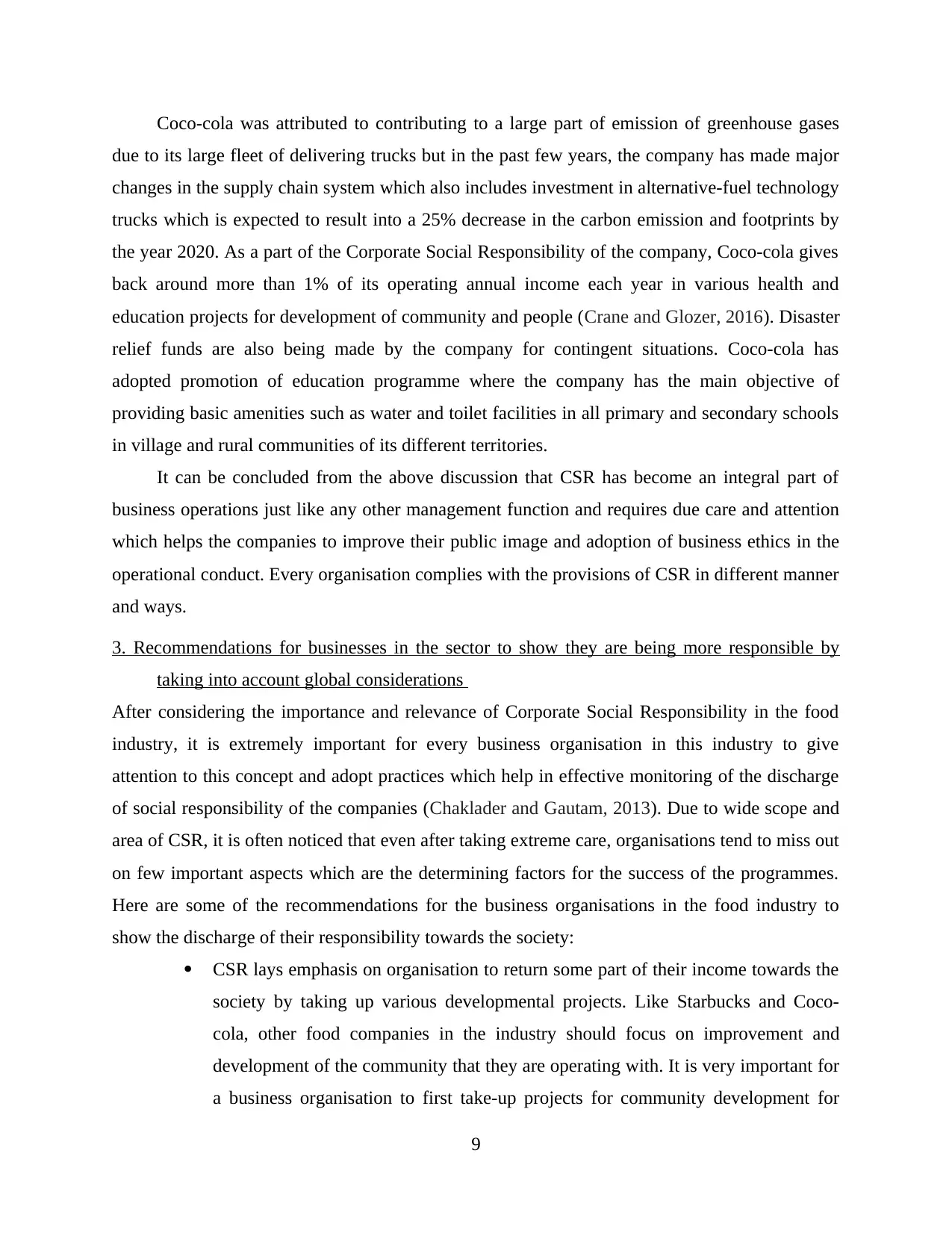
Coco-cola was attributed to contributing to a large part of emission of greenhouse gases
due to its large fleet of delivering trucks but in the past few years, the company has made major
changes in the supply chain system which also includes investment in alternative-fuel technology
trucks which is expected to result into a 25% decrease in the carbon emission and footprints by
the year 2020. As a part of the Corporate Social Responsibility of the company, Coco-cola gives
back around more than 1% of its operating annual income each year in various health and
education projects for development of community and people (Crane and Glozer, 2016). Disaster
relief funds are also being made by the company for contingent situations. Coco-cola has
adopted promotion of education programme where the company has the main objective of
providing basic amenities such as water and toilet facilities in all primary and secondary schools
in village and rural communities of its different territories.
It can be concluded from the above discussion that CSR has become an integral part of
business operations just like any other management function and requires due care and attention
which helps the companies to improve their public image and adoption of business ethics in the
operational conduct. Every organisation complies with the provisions of CSR in different manner
and ways.
3. Recommendations for businesses in the sector to show they are being more responsible by
taking into account global considerations
After considering the importance and relevance of Corporate Social Responsibility in the food
industry, it is extremely important for every business organisation in this industry to give
attention to this concept and adopt practices which help in effective monitoring of the discharge
of social responsibility of the companies (Chaklader and Gautam, 2013). Due to wide scope and
area of CSR, it is often noticed that even after taking extreme care, organisations tend to miss out
on few important aspects which are the determining factors for the success of the programmes.
Here are some of the recommendations for the business organisations in the food industry to
show the discharge of their responsibility towards the society:
CSR lays emphasis on organisation to return some part of their income towards the
society by taking up various developmental projects. Like Starbucks and Coco-
cola, other food companies in the industry should focus on improvement and
development of the community that they are operating with. It is very important for
a business organisation to first take-up projects for community development for
9
due to its large fleet of delivering trucks but in the past few years, the company has made major
changes in the supply chain system which also includes investment in alternative-fuel technology
trucks which is expected to result into a 25% decrease in the carbon emission and footprints by
the year 2020. As a part of the Corporate Social Responsibility of the company, Coco-cola gives
back around more than 1% of its operating annual income each year in various health and
education projects for development of community and people (Crane and Glozer, 2016). Disaster
relief funds are also being made by the company for contingent situations. Coco-cola has
adopted promotion of education programme where the company has the main objective of
providing basic amenities such as water and toilet facilities in all primary and secondary schools
in village and rural communities of its different territories.
It can be concluded from the above discussion that CSR has become an integral part of
business operations just like any other management function and requires due care and attention
which helps the companies to improve their public image and adoption of business ethics in the
operational conduct. Every organisation complies with the provisions of CSR in different manner
and ways.
3. Recommendations for businesses in the sector to show they are being more responsible by
taking into account global considerations
After considering the importance and relevance of Corporate Social Responsibility in the food
industry, it is extremely important for every business organisation in this industry to give
attention to this concept and adopt practices which help in effective monitoring of the discharge
of social responsibility of the companies (Chaklader and Gautam, 2013). Due to wide scope and
area of CSR, it is often noticed that even after taking extreme care, organisations tend to miss out
on few important aspects which are the determining factors for the success of the programmes.
Here are some of the recommendations for the business organisations in the food industry to
show the discharge of their responsibility towards the society:
CSR lays emphasis on organisation to return some part of their income towards the
society by taking up various developmental projects. Like Starbucks and Coco-
cola, other food companies in the industry should focus on improvement and
development of the community that they are operating with. It is very important for
a business organisation to first take-up projects for community development for
9
⊘ This is a preview!⊘
Do you want full access?
Subscribe today to unlock all pages.

Trusted by 1+ million students worldwide
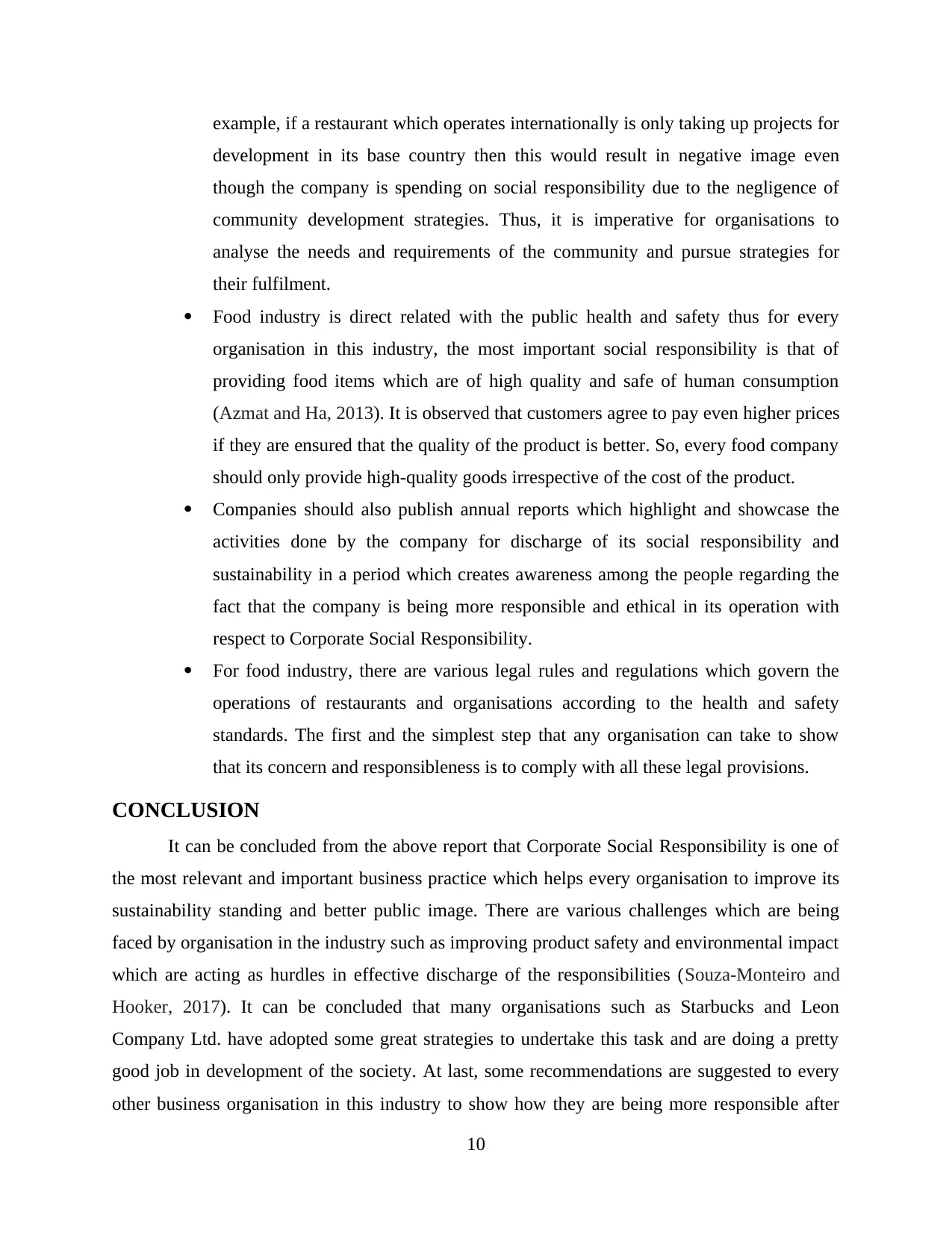
example, if a restaurant which operates internationally is only taking up projects for
development in its base country then this would result in negative image even
though the company is spending on social responsibility due to the negligence of
community development strategies. Thus, it is imperative for organisations to
analyse the needs and requirements of the community and pursue strategies for
their fulfilment.
Food industry is direct related with the public health and safety thus for every
organisation in this industry, the most important social responsibility is that of
providing food items which are of high quality and safe of human consumption
(Azmat and Ha, 2013). It is observed that customers agree to pay even higher prices
if they are ensured that the quality of the product is better. So, every food company
should only provide high-quality goods irrespective of the cost of the product.
Companies should also publish annual reports which highlight and showcase the
activities done by the company for discharge of its social responsibility and
sustainability in a period which creates awareness among the people regarding the
fact that the company is being more responsible and ethical in its operation with
respect to Corporate Social Responsibility.
For food industry, there are various legal rules and regulations which govern the
operations of restaurants and organisations according to the health and safety
standards. The first and the simplest step that any organisation can take to show
that its concern and responsibleness is to comply with all these legal provisions.
CONCLUSION
It can be concluded from the above report that Corporate Social Responsibility is one of
the most relevant and important business practice which helps every organisation to improve its
sustainability standing and better public image. There are various challenges which are being
faced by organisation in the industry such as improving product safety and environmental impact
which are acting as hurdles in effective discharge of the responsibilities (Souza-Monteiro and
Hooker, 2017). It can be concluded that many organisations such as Starbucks and Leon
Company Ltd. have adopted some great strategies to undertake this task and are doing a pretty
good job in development of the society. At last, some recommendations are suggested to every
other business organisation in this industry to show how they are being more responsible after
10
development in its base country then this would result in negative image even
though the company is spending on social responsibility due to the negligence of
community development strategies. Thus, it is imperative for organisations to
analyse the needs and requirements of the community and pursue strategies for
their fulfilment.
Food industry is direct related with the public health and safety thus for every
organisation in this industry, the most important social responsibility is that of
providing food items which are of high quality and safe of human consumption
(Azmat and Ha, 2013). It is observed that customers agree to pay even higher prices
if they are ensured that the quality of the product is better. So, every food company
should only provide high-quality goods irrespective of the cost of the product.
Companies should also publish annual reports which highlight and showcase the
activities done by the company for discharge of its social responsibility and
sustainability in a period which creates awareness among the people regarding the
fact that the company is being more responsible and ethical in its operation with
respect to Corporate Social Responsibility.
For food industry, there are various legal rules and regulations which govern the
operations of restaurants and organisations according to the health and safety
standards. The first and the simplest step that any organisation can take to show
that its concern and responsibleness is to comply with all these legal provisions.
CONCLUSION
It can be concluded from the above report that Corporate Social Responsibility is one of
the most relevant and important business practice which helps every organisation to improve its
sustainability standing and better public image. There are various challenges which are being
faced by organisation in the industry such as improving product safety and environmental impact
which are acting as hurdles in effective discharge of the responsibilities (Souza-Monteiro and
Hooker, 2017). It can be concluded that many organisations such as Starbucks and Leon
Company Ltd. have adopted some great strategies to undertake this task and are doing a pretty
good job in development of the society. At last, some recommendations are suggested to every
other business organisation in this industry to show how they are being more responsible after
10
Paraphrase This Document
Need a fresh take? Get an instant paraphrase of this document with our AI Paraphraser

taking global considerations such as publishing annual reports to showcase the activities
undertaken for the purpose.
11
undertaken for the purpose.
11
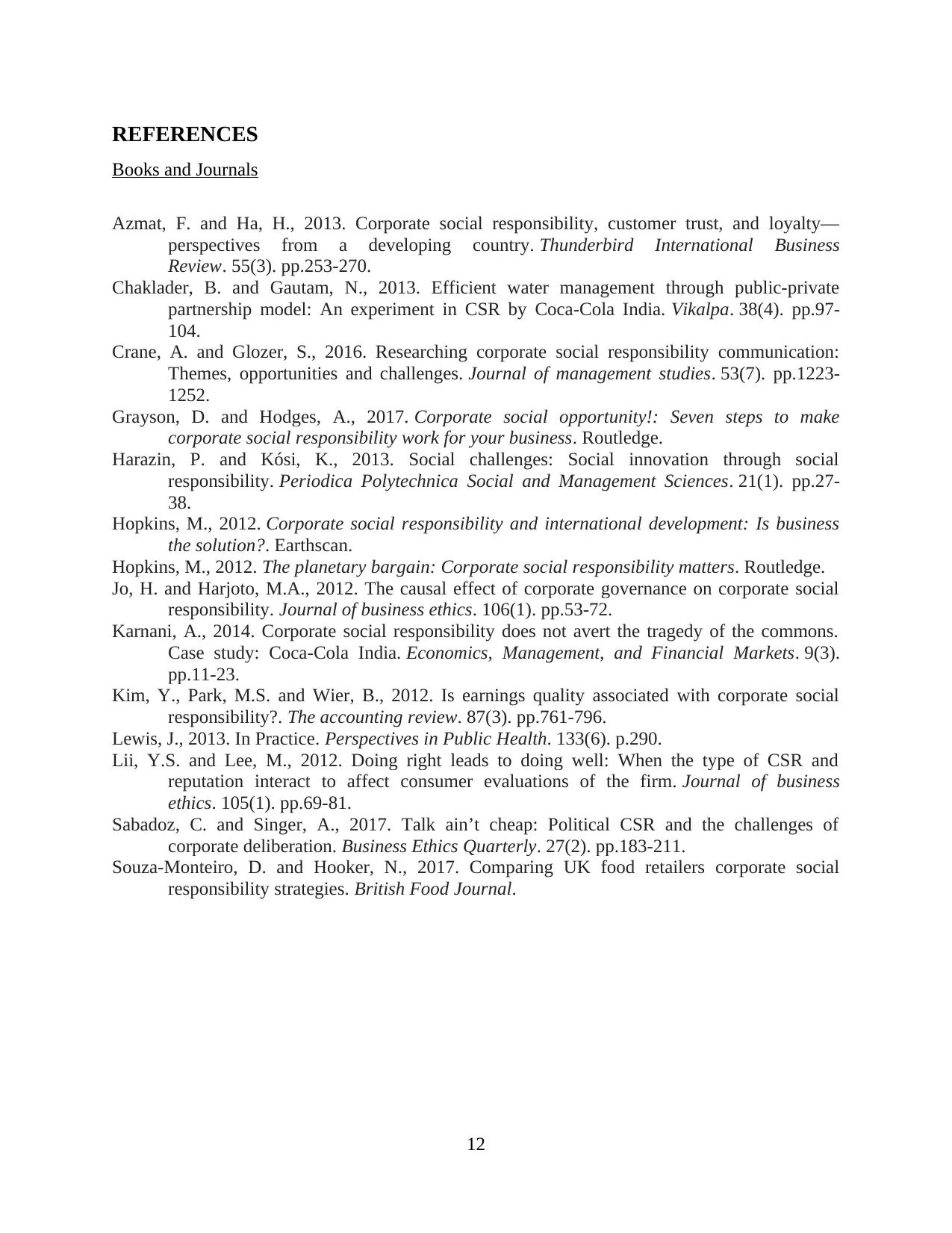
REFERENCES
Books and Journals
Azmat, F. and Ha, H., 2013. Corporate social responsibility, customer trust, and loyalty—
perspectives from a developing country. Thunderbird International Business
Review. 55(3). pp.253-270.
Chaklader, B. and Gautam, N., 2013. Efficient water management through public-private
partnership model: An experiment in CSR by Coca-Cola India. Vikalpa. 38(4). pp.97-
104.
Crane, A. and Glozer, S., 2016. Researching corporate social responsibility communication:
Themes, opportunities and challenges. Journal of management studies. 53(7). pp.1223-
1252.
Grayson, D. and Hodges, A., 2017. Corporate social opportunity!: Seven steps to make
corporate social responsibility work for your business. Routledge.
Harazin, P. and Kósi, K., 2013. Social challenges: Social innovation through social
responsibility. Periodica Polytechnica Social and Management Sciences. 21(1). pp.27-
38.
Hopkins, M., 2012. Corporate social responsibility and international development: Is business
the solution?. Earthscan.
Hopkins, M., 2012. The planetary bargain: Corporate social responsibility matters. Routledge.
Jo, H. and Harjoto, M.A., 2012. The causal effect of corporate governance on corporate social
responsibility. Journal of business ethics. 106(1). pp.53-72.
Karnani, A., 2014. Corporate social responsibility does not avert the tragedy of the commons.
Case study: Coca-Cola India. Economics, Management, and Financial Markets. 9(3).
pp.11-23.
Kim, Y., Park, M.S. and Wier, B., 2012. Is earnings quality associated with corporate social
responsibility?. The accounting review. 87(3). pp.761-796.
Lewis, J., 2013. In Practice. Perspectives in Public Health. 133(6). p.290.
Lii, Y.S. and Lee, M., 2012. Doing right leads to doing well: When the type of CSR and
reputation interact to affect consumer evaluations of the firm. Journal of business
ethics. 105(1). pp.69-81.
Sabadoz, C. and Singer, A., 2017. Talk ain’t cheap: Political CSR and the challenges of
corporate deliberation. Business Ethics Quarterly. 27(2). pp.183-211.
Souza-Monteiro, D. and Hooker, N., 2017. Comparing UK food retailers corporate social
responsibility strategies. British Food Journal.
12
Books and Journals
Azmat, F. and Ha, H., 2013. Corporate social responsibility, customer trust, and loyalty—
perspectives from a developing country. Thunderbird International Business
Review. 55(3). pp.253-270.
Chaklader, B. and Gautam, N., 2013. Efficient water management through public-private
partnership model: An experiment in CSR by Coca-Cola India. Vikalpa. 38(4). pp.97-
104.
Crane, A. and Glozer, S., 2016. Researching corporate social responsibility communication:
Themes, opportunities and challenges. Journal of management studies. 53(7). pp.1223-
1252.
Grayson, D. and Hodges, A., 2017. Corporate social opportunity!: Seven steps to make
corporate social responsibility work for your business. Routledge.
Harazin, P. and Kósi, K., 2013. Social challenges: Social innovation through social
responsibility. Periodica Polytechnica Social and Management Sciences. 21(1). pp.27-
38.
Hopkins, M., 2012. Corporate social responsibility and international development: Is business
the solution?. Earthscan.
Hopkins, M., 2012. The planetary bargain: Corporate social responsibility matters. Routledge.
Jo, H. and Harjoto, M.A., 2012. The causal effect of corporate governance on corporate social
responsibility. Journal of business ethics. 106(1). pp.53-72.
Karnani, A., 2014. Corporate social responsibility does not avert the tragedy of the commons.
Case study: Coca-Cola India. Economics, Management, and Financial Markets. 9(3).
pp.11-23.
Kim, Y., Park, M.S. and Wier, B., 2012. Is earnings quality associated with corporate social
responsibility?. The accounting review. 87(3). pp.761-796.
Lewis, J., 2013. In Practice. Perspectives in Public Health. 133(6). p.290.
Lii, Y.S. and Lee, M., 2012. Doing right leads to doing well: When the type of CSR and
reputation interact to affect consumer evaluations of the firm. Journal of business
ethics. 105(1). pp.69-81.
Sabadoz, C. and Singer, A., 2017. Talk ain’t cheap: Political CSR and the challenges of
corporate deliberation. Business Ethics Quarterly. 27(2). pp.183-211.
Souza-Monteiro, D. and Hooker, N., 2017. Comparing UK food retailers corporate social
responsibility strategies. British Food Journal.
12
⊘ This is a preview!⊘
Do you want full access?
Subscribe today to unlock all pages.

Trusted by 1+ million students worldwide
1 out of 12
Related Documents
Your All-in-One AI-Powered Toolkit for Academic Success.
+13062052269
info@desklib.com
Available 24*7 on WhatsApp / Email
![[object Object]](/_next/static/media/star-bottom.7253800d.svg)
Unlock your academic potential
Copyright © 2020–2026 A2Z Services. All Rights Reserved. Developed and managed by ZUCOL.





